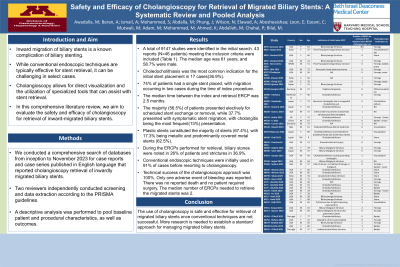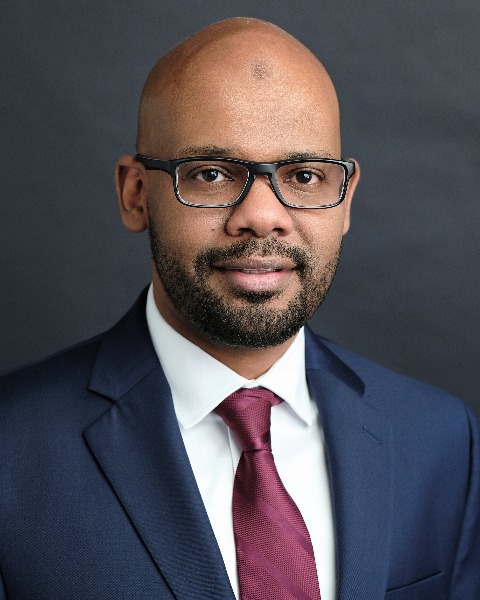Monday Poster Session
Category: Biliary/Pancreas
P1736 - Safety and Efficacy of Cholangioscopy for Retrieval of Migrated Biliary Stents: A Systematic Review and Pooled Analysis
Monday, October 28, 2024
10:30 AM - 4:00 PM ET
Location: Exhibit Hall E

Has Audio

Mohanad Awadalla, MD
Beth Israel Deaconess Medical Center
Shrewsbury, MA
Presenting Author(s)
Mohanad Awadalla, MD1, Azizullah Beran, MD2, Abdellatif Ismail, MD3, Shaikhoon S. Mohammed, MD4, Monzer Abdalla, MD5, Jenson Phung, MD6, Ayman Elawad, MD7, Hazem Abosheaishaa, MD8, Chukwunonso Ezeani, MBBS9, Natalie Wilson, MD6, Erica Loon, DO6, Maali Mutwali, MD10, Mohammad Adam, MD, MSc11, Mouhand F.H. Mohamed, MD, MSc12, Khalid Ahmed, MD13, Mohamed Abdallah, MD14, Prabhleen Chahal, MD15, Mohammad Bilal, MD16
1Beth Israel Deaconess Medical Center, Boston, MA; 2Indiana University School of Medicine, Indianapolis, IN; 3University of Maryland Medical Center, Baltimore, MD; 4Emory Clinic/Emory Healthcare, Atlanta, GA; 5Ascension Saint Francis Hospital, Evanston, IL; 6University of Minnesota, Minneapolis, MN; 7Massachusetts General Hospital, Boston, MA; 8Icahn School of Medicine at Mount Sinai, Queens, NY; 9Baton Rouge General Medical Center, Baton Rouge, LA; 10Michigan State University, Shrewsbury, MA; 11University of Missouri - Kansas City School of Medicine, Kansas City, MO; 12Mayo Clinic, Rochester, MN; 13University of Pennsylvania, Philadelphia, PA; 14Cleveland Clinic, Cleveland, OH; 15Cleveland Clinic Foundation, Cleveland, OH; 16University of Minnesota and Minneapolis VA Health Care System, Minneapolis, MN
Introduction: Inward migration of biliary stents is a known complication of biliary stenting. While conventional endoscopic techniques are typically effective for stent retrieval, it can be challenging in select cases. Cholangioscopy allows for direct visualization and the utilization of specialized tools that can assist with stent retrieval. In this comprehensive literature review, we aim to evaluate the safety and efficacy of cholangioscopy for retrieval of inward-migrated biliary stents.
Methods: We conducted a comprehensive search of databases from inception to November 2023 for case reports and case series published in English language that reported cholangioscopic retrieval of inwardly migrated biliary stents. Two reviewers independently conducted screening and data extraction according to the PRISMA guidelines. A descriptive analysis was performed to pool baseline patient and procedural characteristics, as well as outcomes.
Results: A total of 9147 studies were identified in the initial search. 43 reports (N=46 patients) meeting the inclusion criteria were included (Table 1). The median age was 61 years, and 58.7% were male. Choledocholithiasis was the most common indication for the initial stent placement in 17 cases (36.9%). 74% of patients had a single stent placed, with migration occurring in two cases during the time of index procedure. The median time between the index and retrieval ERCP was 2.5 months. The majority (56.5%) of patients presented for scheduled stent exchange or removal, while 37.7% presented with symptomatic stent migration, with cholangitis being the most frequent (13%) presentation. Plastic stents constituted the majority of stents (67.4%), with 17.3% being metallic and predominantly covered metal stents (62.5%). During the ERCPs performed for retrieval, biliary stones were noted in 26% of patients and strictures in 36.9%. Conventional endoscopic techniques were initially used in 91% of cases before resorting to cholangioscopy. Technical success of the cholangioscopic approach was 100%. Only one adverse event of bleeding was reported. There was no reported death and no patient required surgery. The median number of ERCPs needed to retrieve the migrated stents was 2.
Discussion: The use of cholangioscopy is safe and effective for retrieval of migrated biliary stents once conventional techniques are not successful. More research is needed to establish a standard approach for managing migrated biliary stents.
Note: The table for this abstract can be viewed in the ePoster Gallery section of the ACG 2024 ePoster Site or in The American Journal of Gastroenterology's abstract supplement issue, both of which will be available starting October 27, 2024.
Disclosures:
Mohanad Awadalla, MD1, Azizullah Beran, MD2, Abdellatif Ismail, MD3, Shaikhoon S. Mohammed, MD4, Monzer Abdalla, MD5, Jenson Phung, MD6, Ayman Elawad, MD7, Hazem Abosheaishaa, MD8, Chukwunonso Ezeani, MBBS9, Natalie Wilson, MD6, Erica Loon, DO6, Maali Mutwali, MD10, Mohammad Adam, MD, MSc11, Mouhand F.H. Mohamed, MD, MSc12, Khalid Ahmed, MD13, Mohamed Abdallah, MD14, Prabhleen Chahal, MD15, Mohammad Bilal, MD16. P1736 - Safety and Efficacy of Cholangioscopy for Retrieval of Migrated Biliary Stents: A Systematic Review and Pooled Analysis, ACG 2024 Annual Scientific Meeting Abstracts. Philadelphia, PA: American College of Gastroenterology.
1Beth Israel Deaconess Medical Center, Boston, MA; 2Indiana University School of Medicine, Indianapolis, IN; 3University of Maryland Medical Center, Baltimore, MD; 4Emory Clinic/Emory Healthcare, Atlanta, GA; 5Ascension Saint Francis Hospital, Evanston, IL; 6University of Minnesota, Minneapolis, MN; 7Massachusetts General Hospital, Boston, MA; 8Icahn School of Medicine at Mount Sinai, Queens, NY; 9Baton Rouge General Medical Center, Baton Rouge, LA; 10Michigan State University, Shrewsbury, MA; 11University of Missouri - Kansas City School of Medicine, Kansas City, MO; 12Mayo Clinic, Rochester, MN; 13University of Pennsylvania, Philadelphia, PA; 14Cleveland Clinic, Cleveland, OH; 15Cleveland Clinic Foundation, Cleveland, OH; 16University of Minnesota and Minneapolis VA Health Care System, Minneapolis, MN
Introduction: Inward migration of biliary stents is a known complication of biliary stenting. While conventional endoscopic techniques are typically effective for stent retrieval, it can be challenging in select cases. Cholangioscopy allows for direct visualization and the utilization of specialized tools that can assist with stent retrieval. In this comprehensive literature review, we aim to evaluate the safety and efficacy of cholangioscopy for retrieval of inward-migrated biliary stents.
Methods: We conducted a comprehensive search of databases from inception to November 2023 for case reports and case series published in English language that reported cholangioscopic retrieval of inwardly migrated biliary stents. Two reviewers independently conducted screening and data extraction according to the PRISMA guidelines. A descriptive analysis was performed to pool baseline patient and procedural characteristics, as well as outcomes.
Results: A total of 9147 studies were identified in the initial search. 43 reports (N=46 patients) meeting the inclusion criteria were included (Table 1). The median age was 61 years, and 58.7% were male. Choledocholithiasis was the most common indication for the initial stent placement in 17 cases (36.9%). 74% of patients had a single stent placed, with migration occurring in two cases during the time of index procedure. The median time between the index and retrieval ERCP was 2.5 months. The majority (56.5%) of patients presented for scheduled stent exchange or removal, while 37.7% presented with symptomatic stent migration, with cholangitis being the most frequent (13%) presentation. Plastic stents constituted the majority of stents (67.4%), with 17.3% being metallic and predominantly covered metal stents (62.5%). During the ERCPs performed for retrieval, biliary stones were noted in 26% of patients and strictures in 36.9%. Conventional endoscopic techniques were initially used in 91% of cases before resorting to cholangioscopy. Technical success of the cholangioscopic approach was 100%. Only one adverse event of bleeding was reported. There was no reported death and no patient required surgery. The median number of ERCPs needed to retrieve the migrated stents was 2.
Discussion: The use of cholangioscopy is safe and effective for retrieval of migrated biliary stents once conventional techniques are not successful. More research is needed to establish a standard approach for managing migrated biliary stents.
Note: The table for this abstract can be viewed in the ePoster Gallery section of the ACG 2024 ePoster Site or in The American Journal of Gastroenterology's abstract supplement issue, both of which will be available starting October 27, 2024.
Disclosures:
Mohanad Awadalla indicated no relevant financial relationships.
Azizullah Beran indicated no relevant financial relationships.
Abdellatif Ismail indicated no relevant financial relationships.
Shaikhoon Mohammed indicated no relevant financial relationships.
Monzer Abdalla indicated no relevant financial relationships.
Jenson Phung indicated no relevant financial relationships.
Ayman Elawad indicated no relevant financial relationships.
Hazem Abosheaishaa indicated no relevant financial relationships.
Chukwunonso Ezeani indicated no relevant financial relationships.
Natalie Wilson indicated no relevant financial relationships.
Erica Loon indicated no relevant financial relationships.
Maali Mutwali indicated no relevant financial relationships.
Mohammad Adam indicated no relevant financial relationships.
Mouhand Mohamed indicated no relevant financial relationships.
Khalid Ahmed indicated no relevant financial relationships.
Mohamed Abdallah indicated no relevant financial relationships.
Prabhleen Chahal: Boston Scientific – Advisor or Review Panel Member.
Mohammad Bilal: Boston Scientific – Consultant. Cook endoscopy – Speakers Bureau.
Mohanad Awadalla, MD1, Azizullah Beran, MD2, Abdellatif Ismail, MD3, Shaikhoon S. Mohammed, MD4, Monzer Abdalla, MD5, Jenson Phung, MD6, Ayman Elawad, MD7, Hazem Abosheaishaa, MD8, Chukwunonso Ezeani, MBBS9, Natalie Wilson, MD6, Erica Loon, DO6, Maali Mutwali, MD10, Mohammad Adam, MD, MSc11, Mouhand F.H. Mohamed, MD, MSc12, Khalid Ahmed, MD13, Mohamed Abdallah, MD14, Prabhleen Chahal, MD15, Mohammad Bilal, MD16. P1736 - Safety and Efficacy of Cholangioscopy for Retrieval of Migrated Biliary Stents: A Systematic Review and Pooled Analysis, ACG 2024 Annual Scientific Meeting Abstracts. Philadelphia, PA: American College of Gastroenterology.
